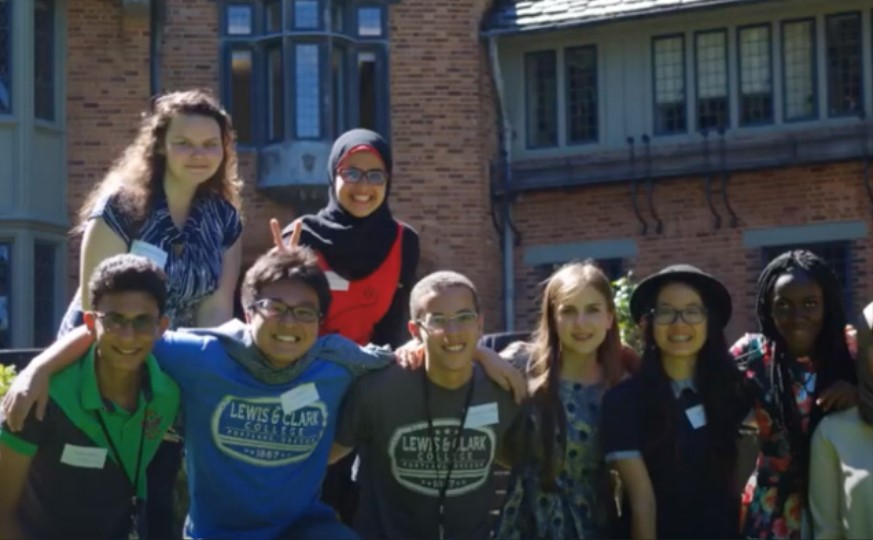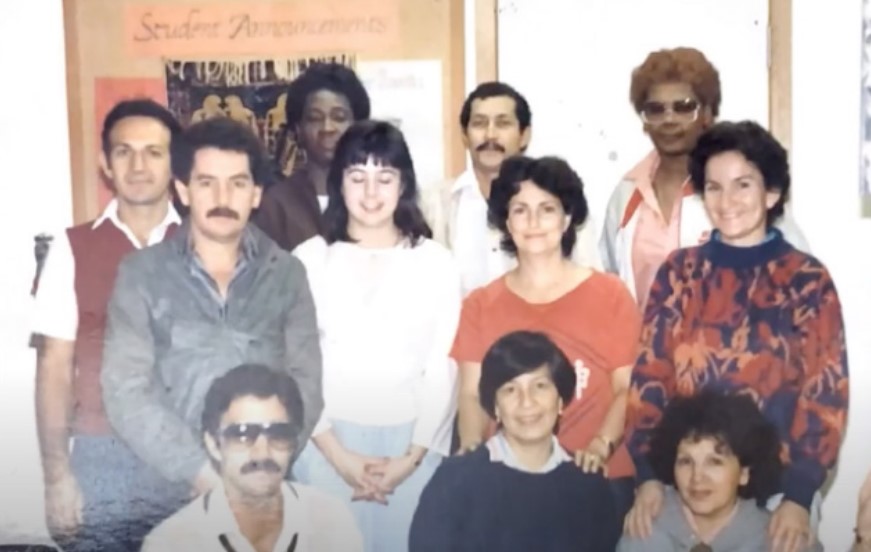Academic English Studies department enters fifth decade with open house, reminisces on long history
This October, Academic English Studies (AES) celebrated its 50th anniversary. As part of the celebration, AES hosted an open house and an alumni event during alumni weekend in June 2022.
Former President of Lewis & Clark John R. Howard established the program with the intention of attracting more international students and supporting the growing population of non-native English speakers on campus. Prudence Douglas was selected from Portland State University as the program’s first director. It was originally called the American Language Institute, and was later changed to the Institute for the Study of American Language and Culture in 1980. It was eventually renamed AES in 2003.
Director Laura Shier, who has headed the program since 2014, explains that the importance of AES stems from helping students adapt to critical thinking in a different language. She noted how teaching academic English is more complex than one would expect because it requires teaching a new way of thinking.
“Our classes are content based, they’re truly trying to mirror what it would be like to be in an undergraduate academic class, and developing the academic language skills,” Shier said. “So how to express yourself well, critical thinking well in English, organizational aspects of writing, developing stronger reading ability, how to participate in a classroom, communication. All of those have a cultural aspect to them; a cross cultural aspect to them that is very nuanced.”
Over the years, the program has waxed and waned in size. It hit its highest enrollment at approximately 140 students. This year, the program is composed of 12 students, most of whom are graduate-level students hoping to attend graduate institutes across the country. Sheir explains the change in enrollment year-by-year is often due to international contexts. For example, in 2005 Saudi Arabia began the King Abdullah Scholarship Program, which led to a massive influx of Saudi students to the United States. Later, the implementation of a similar program at Japan’s Waseda University attracted many students to LC.
“When I started, we had 134 students,” Shier said. “By the second year I was here the majority of the students were coming from Saudi Arabia. And we had really strong numbers with our Japanese study abroad exchange programs.”
However, in the last few years, the program has seen a dramatic decline in enrollment, along with struggles in recruitment. Overall, fewer undergraduate students are dual enrolled in AES and general LC courses.
“That’s one of the probably the biggest changes for me since 2014, is that we don’t have undergraduate students in our program,” Shier said. “We had undergraduate students who took more than just one of our classes — they would take a full semester load of classes [at LC]. And that’s the one thing we’re missing that I’m hoping that we can get back.”
John Barritt, an instructor for AES who has been at LC since 2009, has witnessed the program “growing and shrinking” over the years.
“There were some years in the early teens where we had something like 120 students at one point,” Barritt said. “So there was all of this activity. And now sometimes it feels like a ghost town.”
However, he is still optimistic about the future. AES has always been a dynamic program as it follows international trends. He notes the value of having such a program is seeing students gain confidence in a new language. Shier is exploring ways to build AES back up. One way they hope to do that is by working alongside admissions to accept international students who don’t already have high levels of English fluency. Another option is to look domestically for students who may benefit from the program, such as first-generation immigrants.
“For many of them it’s their first time in the U.S., and coming here and figuring things out, it’s really satisfying when you see students connect with undergraduates at Lewis & Clark,” Barritt said. “For example, when a student comes in who was really quiet and was really reticent about speaking English, and suddenly by the end of the year it’s almost like seeing a different personality.”
AES students Nana Konobe ’25 and Yui Nabae ’25 came to LC to learn English from Tokyo, Japan. They were drawn to LC after hearing about its beautiful campus and welcoming environment.
“I wasn’t familiar with America, and I didnt know where it was better for me, but Portland is a good place so I decided to come here,” Konobe said.
Nabae explains that although the AES program is highly beneficial and also intense. Oftentimes, classes can be repetitive and boring due to their size and frequency, as they meet daily and there are only six to seven students. She is also dual enrolled in Art History courses at LC.
Konobe, who is a business major back home in Japan, describes her experience differently.
“I’m in a different class, so my teacher always gives us new things so I don’t feel it’s boring,” Konobe said. “I like the AES class.”
Her main goal is to speak English more fluently and understand conversations better.
“I’d like to talk more naturally to native speakers,” Konobe said. “Listening to conversation is a little difficult for me.”
As for what the pair would like American students to know about their experience, they describe feeling a lack of interest from American peers regarding how it is to be a part of the program.
“I feel like when I talk to American students about me taking AES, they’re like, ‘oh okay’ and they don’t ask any further,” Nabae said. “I think they’re not really familiar with AES. I also think American students … think it’s normal for international students to speak perfect English. And they just don’t care if we can’t keep up with their conversation or class. They’re just caring about their own business.”
Konobe expressed similar struggles, and suggested that perhaps part of the issue may simply be a lack of understanding.
“I heard most of American people don’t study second language so … They don’t know a lot of my feelings,” Konobe said. “How difficult it is to listen and speak a second language, so they don’t know which word is easy or how to speak slowly. And I can’t say ‘please more slowly.’”
They both urged LC students to consider speaking more slowly, use familiar words and make their language accessible when communicating with English learners. Such engagement benefits everyone because it promotes the type of cross-cultural exchange that AES hoped to foster from its inception 50 years ago.
Subscribe to the Mossy Log Newsletter
Stay up to date with the goings-on at Lewis & Clark! Get the top stories or your favorite section delivered to your inbox whenever we release a new issue.



Leave a Reply